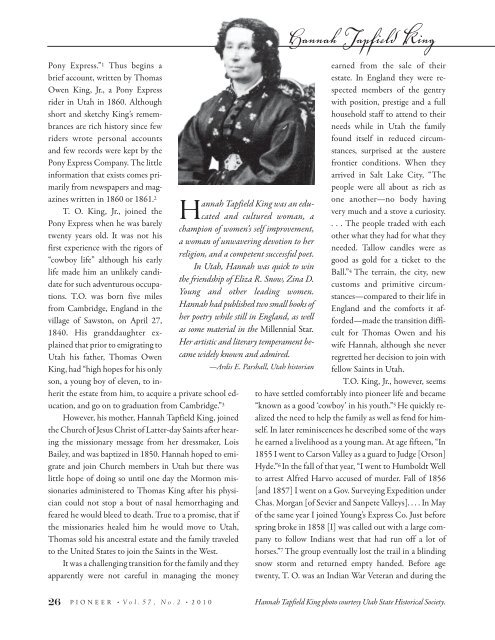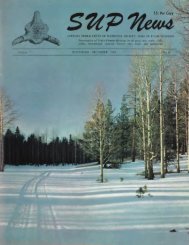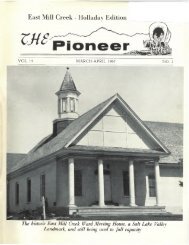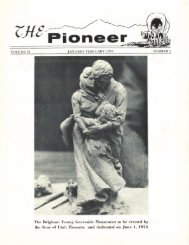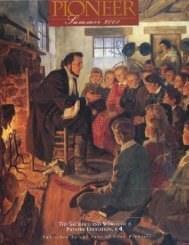Create successful ePaper yourself
Turn your PDF publications into a flip-book with our unique Google optimized e-Paper software.
Pony Express.” 1 Thus begins a<br />
brief account, written by Thomas<br />
Owen King, Jr., a Pony Express<br />
rider in Utah in 1860. Although<br />
short and sketchy King’s remembrances<br />
are rich history since few<br />
riders wrote personal accounts<br />
and few records were kept by the<br />
Pony Express Company. The little<br />
information that exists comes primarily<br />
from newspapers and magazines<br />
written in 1860 or 1861. 2<br />
T. O. King, Jr., joined the<br />
Pony Express when he was barely<br />
twenty years old. It was not his<br />
first experience with the rigors of<br />
“cowboy life” although his early<br />
life made him an unlikely candidate<br />
for such adventurous occupations.<br />
T.O. was born five miles<br />
from Cambridge, England in the<br />
village of Sawston, on April 27,<br />
1840. His granddaughter explained<br />
that prior to emigrating to<br />
Utah his father, Thomas Owen<br />
King, had “high hopes for his only<br />
son, a young boy of eleven, to inherit<br />
the estate from him, to acquire a private school education,<br />
and go on to graduation from Cambridge.” 3<br />
However, his mother, Hannah Tapfield King, joined<br />
the Church of Jesus Christ of Latter-day Saints after hearing<br />
the missionary message from her dressmaker, Lois<br />
Bailey, and was baptized in 1850. Hannah hoped to emigrate<br />
and join Church members in Utah but there was<br />
little hope of doing so until one day the Mormon missionaries<br />
administered to Thomas King after his physician<br />
could not stop a bout of nasal hemorrhaging and<br />
feared he would bleed to death. True to a promise, that if<br />
the missionaries healed him he would move to Utah,<br />
Thomas sold his ancestral estate and the family traveled<br />
to the United States to join the Saints in the West.<br />
It was a challenging transition for the family and they<br />
apparently were not careful in managing the money<br />
Hannah Tapfield King was an educated<br />
and cultured woman, a<br />
champion of women’s self improvement,<br />
a woman of unwavering devotion to her<br />
religion, and a competent successful poet.<br />
In Utah, Hannah was quick to win<br />
the friendship of Eliza R. Snow, Zina D.<br />
Young and other leading women.<br />
Hannah had published two small books of<br />
her poetry while still in England, as well<br />
as some material in the Millennial Star.<br />
Her artistic and literary temperament became<br />
widely known and admired.<br />
earned from the sale of their<br />
estate. In England they were respected<br />
members of the gentry<br />
with position, prestige and a full<br />
household staff to attend to their<br />
needs while in Utah the family<br />
found itself in reduced circumstances,<br />
surprised at the austere<br />
frontier conditions. When they<br />
arrived in Salt Lake City, “The<br />
people were all about as rich as<br />
one another—no body having<br />
very much and a stove a curiosity.<br />
. . . The people traded with each<br />
other what they had for what they<br />
needed. Tallow candles were as<br />
good as gold for a ticket to the<br />
Ball.” 4 The terrain, the city, new<br />
customs and primitive circumstances—compared<br />
to their life in<br />
England and the comforts it afforded—made<br />
the transition difficult<br />
for Thomas Owen and his<br />
wife Hannah, although she never<br />
regretted her decision to join with<br />
fellow Saints in Utah.<br />
T.O. King, Jr., however, seems<br />
to have settled comfortably into pioneer life and became<br />
“known as a good ‘cowboy’ in his youth.” 5 He quickly realized<br />
the need to help the family as well as fend for himself.<br />
In later reminiscences he described some of the ways<br />
he earned a livelihood as a young man. At age fifteen, “In<br />
1855 I went to Carson Valley as a guard to Judge [Orson]<br />
Hyde.” 6 In the fall of that year, “I went to Humboldt Well<br />
to arrest Alfred Harvo accused of murder. Fall of 1856<br />
[and 1857] I went on a Gov. Surveying Expedition under<br />
Chas. Morgan [of Sevier and Sanpete Valleys]. . . . In May<br />
of the same year I joined Young’s Express Co. Just before<br />
spring broke in 1858 [I] was called out with a large company<br />
to follow Indians west that had run off a lot of<br />
horses.” 7 The group eventually lost the trail in a blinding<br />
snow storm and returned empty handed. Before age<br />
twenty, T. O. was an Indian War Veteran and during the<br />
—Ardis E. Parshall, Utah historian<br />
Hannah Tapfield King<br />
26<br />
PIONEER ◆ Vol. 57, <strong>No.2</strong> ◆ <strong>2010</strong><br />
Hannah Tapfield King photo courtesy Utah State Historical Society.


